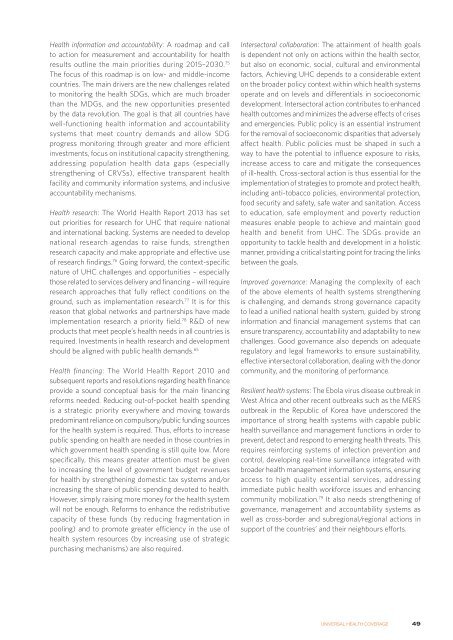You also want an ePaper? Increase the reach of your titles
YUMPU automatically turns print PDFs into web optimized ePapers that Google loves.
Health information and accountability: A roadmap and call<br />
<strong>to</strong> action for measurement and accountability for health<br />
results outline the main priorities during 2015–2030. 75<br />
The focus of this roadmap is on low- and middle-income<br />
countries. The main drivers are the new challenges related<br />
<strong>to</strong> moni<strong>to</strong>ring the health SDGs, which are much broader<br />
than the MDGs, and the new opportunities presented<br />
by the data revolution. The goal is that all countries have<br />
well-functioning health information and accountability<br />
systems that meet country demands and allow SDG<br />
progress moni<strong>to</strong>ring through greater and more efficient<br />
investments, focus on institutional capacity strengthening,<br />
addressing population health data gaps (especially<br />
strengthening of CRVSs), effective transparent health<br />
facility and community information systems, and inclusive<br />
accountability mechanisms.<br />
Health research: The World Health Report 2013 has set<br />
out priorities for research for UHC that require national<br />
and international backing. Systems are needed <strong>to</strong> develop<br />
national research agendas <strong>to</strong> raise funds, strengthen<br />
research capacity and make appropriate and effective use<br />
of research findings. 76 Going forward, the context-specific<br />
nature of UHC challenges and opportunities – especially<br />
those related <strong>to</strong> services delivery and financing – will require<br />
research approaches that fully reflect conditions on the<br />
ground, such as implementation research. 77 It is for this<br />
reason that global networks and partnerships have made<br />
implementation research a priority field. 78 R&D of new<br />
products that meet people’s health needs in all countries is<br />
required. Investments in health research and development<br />
should be aligned with public health demands. 65<br />
Health financing: The World Health Report 2010 and<br />
subsequent reports and resolutions regarding health finance<br />
provide a sound conceptual basis for the main financing<br />
reforms needed. Reducing out-of-pocket health spending<br />
is a strategic priority everywhere and moving <strong>to</strong>wards<br />
predominant reliance on compulsory/public funding sources<br />
for the health system is required. Thus, efforts <strong>to</strong> increase<br />
public spending on health are needed in those countries in<br />
which government health spending is still quite low. More<br />
specifically, this means greater attention must be given<br />
<strong>to</strong> increasing the level of government budget revenues<br />
for health by strengthening domestic tax systems and/or<br />
increasing the share of public spending devoted <strong>to</strong> health.<br />
However, simply raising more money for the health system<br />
will not be enough. Reforms <strong>to</strong> enhance the redistributive<br />
capacity of these funds (by reducing fragmentation in<br />
pooling) and <strong>to</strong> promote greater efficiency in the use of<br />
health system resources (by increasing use of strategic<br />
purchasing mechanisms) are also required.<br />
Intersec<strong>to</strong>ral collaboration: The attainment of health goals<br />
is dependent not only on actions within the health sec<strong>to</strong>r,<br />
but also on economic, social, cultural and environmental<br />
fac<strong>to</strong>rs. Achieving UHC depends <strong>to</strong> a considerable extent<br />
on the broader policy context within which health systems<br />
operate and on levels and differentials in socioeconomic<br />
development. Intersec<strong>to</strong>ral action contributes <strong>to</strong> enhanced<br />
health outcomes and minimizes the adverse effects of crises<br />
and emergencies. Public policy is an essential instrument<br />
for the removal of socioeconomic disparities that adversely<br />
affect health. Public policies must be shaped in such a<br />
way <strong>to</strong> have the potential <strong>to</strong> influence exposure <strong>to</strong> risks,<br />
increase access <strong>to</strong> care and mitigate the consequences<br />
of ill-health. Cross-sec<strong>to</strong>ral action is thus essential for the<br />
implementation of strategies <strong>to</strong> promote and protect health,<br />
including anti-<strong>to</strong>bacco policies, environmental protection,<br />
food security and safety, safe water and sanitation. Access<br />
<strong>to</strong> education, safe employment and poverty reduction<br />
measures enable people <strong>to</strong> achieve and maintain good<br />
health and benefit <strong>from</strong> UHC. The SDGs provide an<br />
opportunity <strong>to</strong> tackle health and development in a holistic<br />
manner, providing a critical starting point for tracing the links<br />
between the goals.<br />
Improved governance: Managing the complexity of each<br />
of the above elements of health systems strengthening<br />
is challenging, and demands strong governance capacity<br />
<strong>to</strong> lead a unified national health system, guided by strong<br />
information and financial management systems that can<br />
ensure transparency, accountability and adaptability <strong>to</strong> new<br />
challenges. Good governance also depends on adequate<br />
regula<strong>to</strong>ry and legal frameworks <strong>to</strong> ensure sustainability,<br />
effective intersec<strong>to</strong>ral collaboration, dealing with the donor<br />
community, and the moni<strong>to</strong>ring of performance.<br />
Resilient health systems: The Ebola virus disease outbreak in<br />
West Africa and other recent outbreaks such as the MERS<br />
outbreak in the Republic of Korea have underscored the<br />
importance of strong health systems with capable public<br />
health surveillance and management functions in order <strong>to</strong><br />
prevent, detect and respond <strong>to</strong> emerging health threats. This<br />
requires reinforcing systems of infection prevention and<br />
control, developing real-time surveillance integrated with<br />
broader health management information systems, ensuring<br />
access <strong>to</strong> high quality essential services, addressing<br />
immediate public health workforce issues and enhancing<br />
community mobilization. 79 It also needs strengthening of<br />
governance, management and accountability systems as<br />
well as cross-border and subregional/regional actions in<br />
support of the countries’ and their neighbours efforts.<br />
UNIVERSAL HEALTH COVERAGE<br />
49


